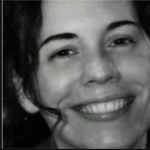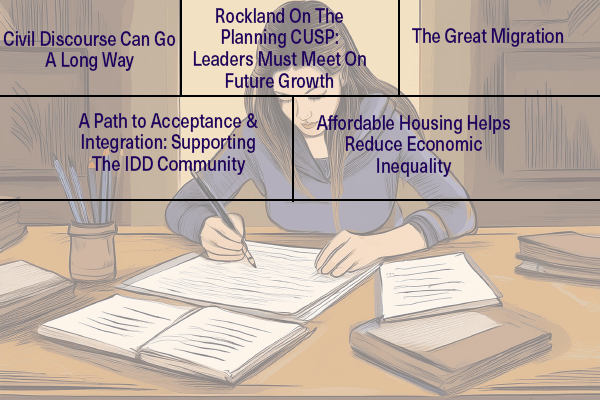|
RCBJ-Audible (Listen For Free)
|
RCBJ put out a call for 250-word mini essays to help celebrate our seventh year of publication and you responded! You’ve told us what you think. You’ve shown us what you’re passionate about. Every single essay embodies what it means to live productively and consciously in a community. Last month we published nine essays. Here are five more.

- Civil Discourse Can Go A Long Way, by Frank LoBuono (Host of BeingFrank, A Podcast Featuring Commentary, Dissent, Opinion)
- Rockland On The Planning CUSP: County, Municipal Leaders Must Meet On Future Growth, by Arthur H. Gunther III (Former Editorial Page Editor of the Rockland Journal-News)
- The Great Migration, by Laura Metallo-Bidon (Licensed Social Worker And A Member Of CUPON)
- A Path to Acceptance and Integration: Supporting the IDD Community, by Erica Amoroso (Director of Communication & Education at The Arc Rockland)
- Affordable Housing Helps Reduce Economic Inequality, by Alana Smith (Principal of Calyx Development Corporation)
Civil Discourse Can Go A Long Way, by Frank LoBuono

Winston Churchill once said, “tact is the ability to tell someone to go to hell in such a way that they look forward to the trip”.
Like most quotes that last, it says a lot in a single sentence.
There’s a beautiful simplicity in his use of language. In a way, it’s both vulgar and sublime. And, within that, lies its genius. It’s also clever, conveying a sense of humor that, despite a sharp edge, makes the statement palatable.
And, perhaps most importantly, it means that it is possible to intensely disagree with someone and still engage in civil discourse. It’s a skill that seems to be sorely lacking today.
There may be many reasons for this, not the least of which has been the incredible rise in our use of Social Media. Lately, there have been many studies demonstrating both the wonders and pitfalls of our love affair with the internet. They seem to me to be both sides of the same coin.
On one hand, we have access to a world of information that is virtually limitless and unimaginable just a generation ago. There is almost nothing we can’t learn if we so desire. And our access to it is almost immediate. So fast in fact, that I believe all of us are guilty of impatience when we must wait for more than a few seconds for our computers to give us EXACTLY what we want.
On the other hand, there is also a sense of anonymity when we react with each other through the internet. It provides an electronic wall of protection that often allows us to say and do things we might not consider if done in a more personal and direct way. We can flash to anger when we see, read, or hear something that we adamantly disagree with and with a single key stroke, vent to one’s heart’s desire, i.e. instant gratification.
Sure, you might feel better in the moment, but did we really accomplish anything? Have we come to a greater understanding, even if we disagree? Unfortunately, I think not.
Lastly, Churchill’s statement suggests that we need not compromise our principles when debating with others, especially during a time of such fractured politics. However, it also allows for others to have the same rights to not relinquish theirs. And, in this crucial election year, it’s never been more important that we find ways to close what seems to be an ever-widening gap. One way, perhaps the only way, is to continue to engage in spirited, passionate, respectful dialogue.
Try a little tact too. It may go a long way.
Frank LoBuono is the host of BeingFrank, a podcast featuring commentary, dissent, opinion.
Rockland On The Planning CUSP: County, Municipal Leaders Must Meet On Future Growth, by Arthur H. Gunther III

As a third-generation Rocklander and the retired longtime Editorial Page editor of the former Rockland Journal-News but, more importantly, as a child of post-World War II, I have witnessed and commented on the county’s morphing from rural farming to suburbia and now to suburban-urban. The journey has been sweet and also bitter. I fear for the future.
The journey has been one of welcomed yet often harried, poorly planned growth in an always diverse region so close to New York City, with a rich heritage from Native Americans to the Dutch, the English and immigrants from all over the world.
There has been “progress” and shared opportunity but also mistakes, greed and missed moments to plan much better.
Rapid post-war growth replaced farms with housing developments, which while welcoming the growing middle-class of the 1950s, often came – still does – at the price of filled-in floodplains, added and sometimes neglected density, one highway shopping strip after another that has taken business from aging downtowns and at the cost of heavier traffic.
Early planners were volunteer citizens with great spirit but little knowledge. County, town and village officials looked largely at funding budgets with more tax ratables rather than allowing for growth that protected the environment and which fit the space.
Developers came, built, took profit and left drainage and other woes. Not all but enough.
That was 1947-2024. Now 2024-on, Rockland is facing the call for more growth, particularly “affordable housing” that is illusory because land, construction and material costs largely prevent that while simply adding density which profits the builder yet brings more traffic, environmental woes and reduced quality of life. Growth for its own sake has its limit. Planned growth and innovative construction can provide solutions.
Time is at hand for a meeting of county and municipal leaders, a consortium to plan wisely for the years ahead, with the rebuilding of older developments; with protecting floodplains and green space and dealing with climate change; with greatly improving the infrastructure; and with reworking roads, intersections and traffic patterns, among other concerns.
Rockland will continue growing; may it be without the many mistakes of the past decades.
Arthur H. Gunther III is a former Editorial Page Editor of the Rockland Journal-News.
The Great Migration, by Laura Metallo-Bidon

History repeats itself. To what end?
Neighborhoods change over time. Older residents age out. New families move in. It’s a natural progression. The cycle of life.
But this feels different.
Unsolicited phone calls: “Cash buyers for your home.”
Strangers in my driveway: “You look like a smart person. Are you ready to sell?”
House after house, sold and converted to rental units, with a revolving door of tenants.
They say history repeats itself. I grew up in 1960’s Chicago. The Great Migration brought an influx of southern Blacks north to the city, seeking jobs, homes, and a better standard of living. The need for affordable housing grew, at the same time as buildings and infrastructure crumbled. Racial tensions and ‘White flight’ spiked. The city’s response: urban renewal. Highways were built, strategically, dividing the city in two—a de facto racial divide. There was money to be made, as neighborhoods were bought, sold, and razed to make way for massive re-development….
As a child, I didn’t understand my grandparents’ fears as strangers knocked at their door. “Cash buyers for your home.” They eventually sold for pennies on the dollar.
I get it now. Is my neighborhood for sale? What will become of my home? My memories? Where will I go?
A great migration. There is money to be made from our vulnerability and fear. “Cash buyers for your home.”
History repeats itself. To what end?
Laura Metallo-Bidon is a 30 year resident of Rockland County, a licensed social worker and a member of CUPON Clarkstown.
A Path to Acceptance & Integration: Supporting The IDD Community, by Erica Amoroso

As The Arc Rockland celebrates its 70th anniversary, we are reminded of how far we’ve come in advocating for individuals with intellectual and developmental disabilities (IDD). However, acceptance and integration remain ongoing pursuits, both in Rockland County and beyond. The challenges faced by the IDD community are not solely personal but resonate universally within our collective responsibility as a society.
Organizations in Rockland County can be pivotal in fostering a supportive environment for the IDD population. Employment is one critical pathway to integration. By offering meaningful work opportunities, businesses can help bridge the gap between independence and societal contribution. Learning programs, both formal and informal, provide another essential avenue. Whether through job training, life skills education, or inclusion in community programs, such initiatives enrich the lives of individuals with IDD and the community at large.
Philanthropic support also plays a vital role. Local businesses and organizations have the capacity to uplift these programs through donations, volunteerism, and partnerships. By prioritizing the inclusion of the IDD population in their missions, these entities create a ripple effect of empowerment and understanding.
Rockland County has the unique opportunity to lead by example in this regard, showing how acceptance and integration of the IDD community can strengthen our social fabric. It’s a vision that not only honors the past but ensures a more inclusive future for all, one that The Arc Rockland will continue to champion.
Erica Amoroso is Director of Communication & Education at The Arc Rockland.
Affordable Housing Helps Reduce Economic Inequality, by Alana Smith

Affordable housing is often misunderstood, with misconceptions that it lowers property values or creates negative social outcomes. However, these views overlook the broader economic and social benefits that affordable housing can provide to entire communities.
One common misconception is that affordable housing will drive down neighboring property values. In fact, studies show that well-designed affordable housing has no negative impact on property values. By revitalizing underused or vacant areas, these developments can actually enhance neighborhood aesthetics, which can attract businesses and stimulate local economies.
Additionally, affordable housing helps reduce economic inequality by giving low- and middle-income families the opportunity to live closer to work, reducing commute times and transportation costs. This, in turn, leads to a more stable workforce and increases productivity, which benefits local businesses. With more disposable income, residents are also able to spend more on goods and services, further boosting the economy.
Socially, affordable housing fosters diverse and inclusive communities. It provides stable living conditions, which lead to better educational and health outcomes for residents, especially children.
These improvements have long-term benefits for society as a whole, as healthier, better-educated populations are less reliant on public services and more likely to contribute to the economy.
Overall, affordable housing is not just a benefit for those who move in but also a positive force for entire communities, fostering economic growth and social well-being.
Alana Smith is Principal of Calyx Development Corporation.


















